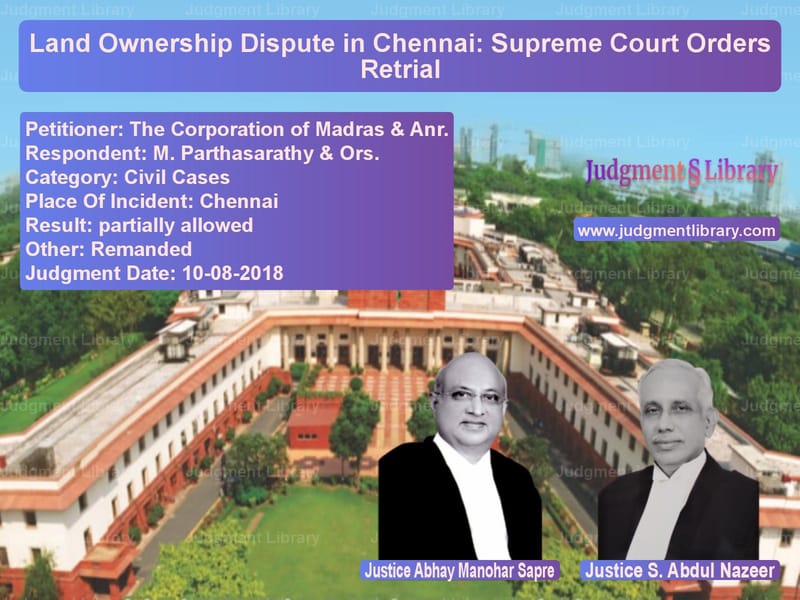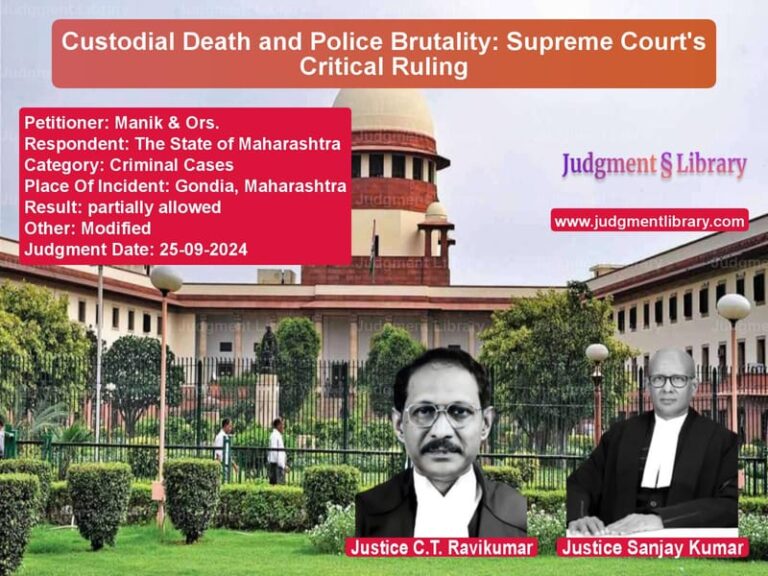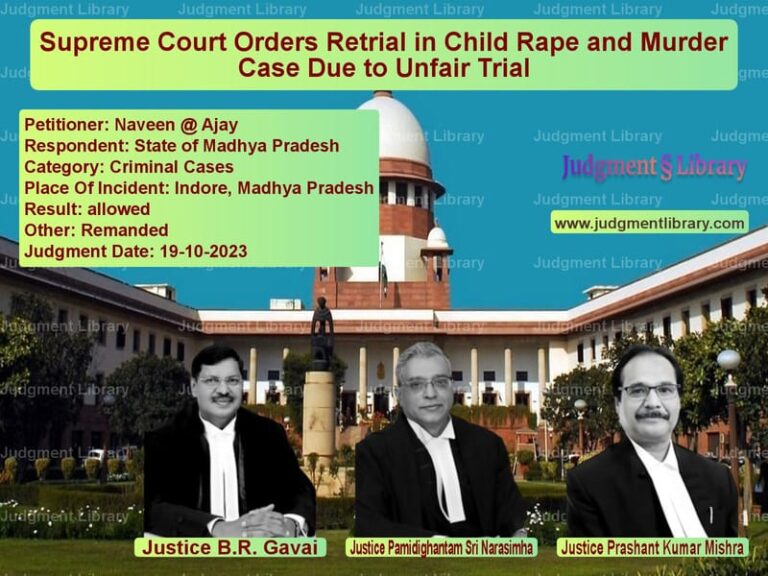Land Ownership Dispute in Chennai: Supreme Court Orders Retrial
The case of The Corporation of Madras & Anr. vs. M. Parthasarathy & Ors. is a landmark property dispute regarding the ownership of a 3600-square-foot plot located in Block No. 15, Aminjikarai Village, Pulla Reddy Avenue, Chennai. This case has undergone multiple legal proceedings, moving from the City Civil Court of Chennai to the High Court of Madras, and ultimately to the Supreme Court of India. The core issue was whether the respondents, claiming ownership of the suit land, had a legitimate right over the property or if it belonged to the Corporation of Madras.
Background of the Case
The dispute began when the respondents, asserting ownership over the disputed property, filed four separate civil suits (O.S. Nos. 2207/1992, 2345/1992, 2346/1992, and 2347/1992) in the City Civil Court, Chennai. They sought a permanent injunction against the appellants, arguing that the Corporation of Madras had no rightful claim over the land.
In response, the Corporation of Madras contended that the land was public property and did not belong to the respondents. Thus, a legal battle ensued to determine the rightful ownership of the land.
Trial Court Proceedings
The trial court, after considering the evidence and arguments presented by both parties, ruled against the respondents. On 24.09.1993, the court dismissed all four civil suits, concluding that the respondents had failed to establish their legitimate ownership over the disputed land. Dissatisfied with this outcome, the respondents filed first appeals (A.S. Nos. 338 to 341/1993) before the 8th Additional District Judge, Chennai.
First Appellate Court Proceedings
During the appeal, the respondents sought to introduce new evidence by filing an application under Order 41 Rule 27 of the Code of Civil Procedure (CMP No. 1559/1993). The first appellate court accepted the application, admitted the additional evidence, and ultimately overturned the trial court’s decision, ruling in favor of the respondents.
Arguments by the Petitioners (Appellants)
- The first appellate court committed a jurisdictional error by admitting additional evidence without allowing the appellants an opportunity to present rebuttal evidence.
- Instead of ruling on the merits, the appellate court should have either remanded the case for a retrial or framed additional issues for reconsideration.
- The second appeals filed before the High Court of Madras were dismissed without addressing these procedural violations.
Arguments by the Respondents
- The additional evidence was crucial in proving their ownership of the disputed land.
- The first appellate court was well within its jurisdiction to admit and evaluate the additional evidence.
- The High Court’s dismissal of the second appeals was justified as it affirmed the factual findings of the first appellate court.
Supreme Court’s Analysis
A two-judge bench of the Supreme Court, comprising Abhay Manohar Sapre and S. Abdul Nazeer, carefully examined the procedural history of the case. The Court identified several critical errors in the first appellate court’s judgment and made the following observations:
- “The first appellate court committed two jurisdictional errors in allowing the appeals.”
- “The additional evidence was considered without affording the appellants an opportunity to file rebuttal evidence, thereby violating principles of natural justice.”
- “The appellate court failed to invoke the provisions of Order 41 Rule 23-A and Order 41 Rule 25, which allow for remanding the case or framing additional issues.”
Supreme Court’s Judgment
Based on these errors, the Supreme Court ruled:
- The judgment of the first appellate court was set aside due to procedural violations.
- The case was remanded to the trial court for a fresh retrial, allowing both parties to present additional evidence.
- The trial court was instructed to complete the retrial within one year.
Legal Precedents Considered
The Supreme Court referenced several key precedents in reaching its decision:
- Land Acquisition Officer, City Improvement Trust Board vs. H. Narayanaiah – This case established that failure to allow rebuttal evidence in appellate proceedings constitutes a violation of natural justice.
- Shalimar Chemical Works Ltd. vs. Surendra Oil & Dal Mills – Confirmed that additional evidence must be examined through the adversarial process before being accepted.
- Akhilesh Singh vs. Lal Babu Singh – Reaffirmed that procedural fairness must be ensured in appellate proceedings.
Impact of the Judgment
The Supreme Court’s ruling in this case has profound implications for property law and judicial review procedures. It establishes key procedural safeguards to prevent appellate courts from arbitrarily accepting additional evidence without providing the opposing party an opportunity to challenge it.
Additionally, this judgment emphasizes:
- The necessity of procedural fairness in admitting additional evidence.
- The limited scope of appellate courts in ruling on new evidence without a proper adversarial review.
- The importance of ensuring that both parties receive a fair opportunity to present their case.
Conclusion
The Supreme Court’s ruling in The Corporation of Madras & Anr. vs. M. Parthasarathy & Ors. is a landmark case that upholds the principles of procedural fairness and due process in property disputes. By remanding the case for a retrial, the Court ensured that both parties could present their evidence and arguments in accordance with legal standards.
This case serves as an important precedent for similar disputes, reinforcing the necessity of adhering to established legal procedures when handling property claims. The Supreme Court’s intervention underscores the judiciary’s commitment to ensuring fairness and transparency in legal proceedings.
Petitioner Name: The Corporation of Madras & Anr..Respondent Name: M. Parthasarathy & Ors..Judgment By: Justice Abhay Manohar Sapre, Justice S. Abdul Nazeer.Place Of Incident: Chennai.Judgment Date: 10-08-2018.
Don’t miss out on the full details! Download the complete judgment in PDF format below and gain valuable insights instantly!
Download Judgment: The Corporation of M vs M. Parthasarathy & O Supreme Court of India Judgment Dated 10-08-2018.pdf
Direct Downlaod Judgment: Direct downlaod this Judgment
See all petitions in Property Disputes
See all petitions in Landlord-Tenant Disputes
See all petitions in Damages and Compensation
See all petitions in Judgment by Abhay Manohar Sapre
See all petitions in Judgment by S. Abdul Nazeer
See all petitions in partially allowed
See all petitions in Remanded
See all petitions in supreme court of India judgments August 2018
See all petitions in 2018 judgments
See all posts in Civil Cases Category
See all allowed petitions in Civil Cases Category
See all Dismissed petitions in Civil Cases Category
See all partially allowed petitions in Civil Cases Category







